As you rely on your portable heater to keep your space cozy during chilly months, it's essential to remember that, like a well-oiled machine, its longevity is directly tied to the care and attention you provide. You've invested in this appliance for comfort, but without proper maintenance, its lifespan could be significantly shortened. It's not just about flicking the switch on and off; you should consider the manufacturer's guidelines for care, the importance of a regular maintenance schedule, and the subtle signs that suggest your heater may be in need of a tune-up or repair. By understanding the nuances of proper heater care, you position yourself to not only enhance the efficiency of your device but also avoid the inconvenience and cost of premature replacement. What you may not realize is that some simple, preventative measures can have a profound impact on the durability and performance of your heater, and we're about to uncover exactly what those measures are.
Key Takeaways
- Regular maintenance and cleaning are essential to optimize the lifespan of your portable heater.
- Proper storage practices, such as choosing a suitable storage area and emptying the fuel tank, can prevent leaks and fire hazards.
- Following optimal usage guidelines, including keeping burners clean and inspecting fuel systems, ensures efficient operation and prevents issues.
- Inspecting for common issues and identifying wear signs allows for early detection of problems and timely repairs or part replacements.
Regular Maintenance Schedule
To maximize your portable heater's efficiency and longevity, it's essential to adhere to the manufacturer's recommended maintenance schedule and conduct regular inspections. Consistent care is the cornerstone of reliable heating systems, and your portable heater is no exception. Regular maintenance tasks often involve thorough cleaning to prevent dust and debris from clogging the heater's components, which can impede performance and pose a fire hazard.
You should also focus on lubricating any moving parts within the heater. This step reduces friction and wear, which, if neglected, can lead to premature breakdowns. Use only the lubricants specified by the manufacturer to ensure compatibility and avoid causing damage.
Be vigilant for signs of wear and tear, and promptly replace worn-out components. Delays in addressing these issues can exacerbate problems, leading to more extensive damage or even complete system failure. It's better to manage these repairs early to save time and money in the long run.
Proper Storage Practices
Ensure you store your portable heater in a dry, well-ventilated space to guard against moisture and corrosion. This practice not only helps maintain optimal performance but also minimizes safety risks when the heater is not in use. Here's how you can ensure your heater is stored properly:
- Location: Choose a storage area away from flammable materials and high foot traffic to reduce accident risks. The right environment prevents hazardous conditions and extends the life of your heater.
- Fuel Removal: If your heater runs on fuel, empty the tank before storage. This precaution prevents leaks, odors, and potential fire hazards, ensuring the safety of your surroundings.
- Covering: Protect your heater from dust and debris by storing it in its original packaging or by using a suitable protective material. A clean heater is less likely to have operational issues when you need it.
Cleaning and Care Techniques
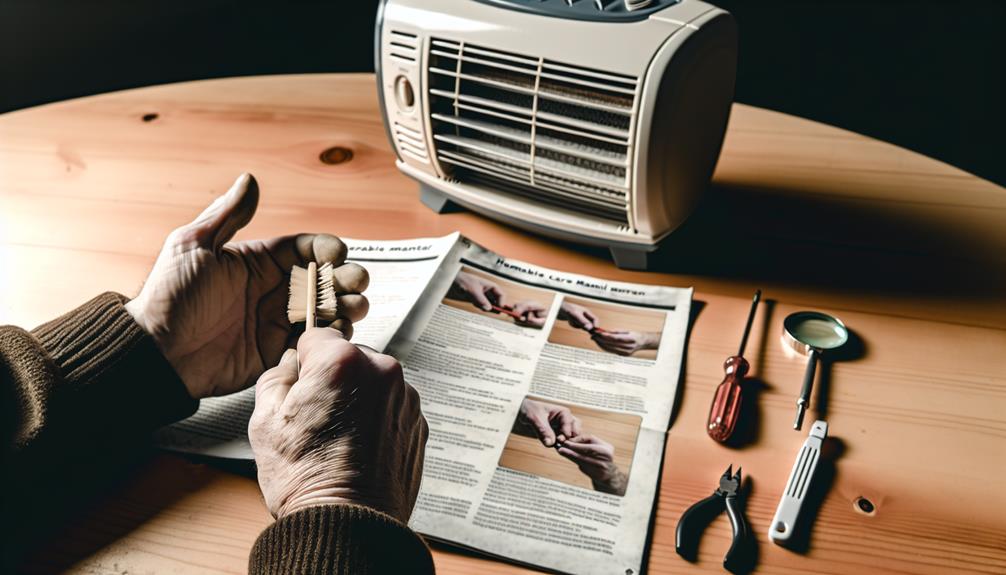
Regularly cleaning and inspecting your portable heater's burners can significantly enhance its performance and longevity. When you're implementing cleaning and care techniques, make sure to replace air filters as recommended by the manufacturer to maintain optimal air quality and heater efficiency. It's not just about cleanliness; it's about ensuring your heater operates safely and effectively.
To keep you on track, here's a practical table outlining key maintenance tasks:
| Maintenance Task | Frequency | Purpose |
|---|---|---|
| Clean and inspect burners | As needed | Prevent damage and corrosion |
| Calibrate controls | Periodically | Ensure accurate temperature and efficiency |
| Check and replace air filters | According to schedule | Maintain air quality and heater performance |
Don't neglect routine fuel system inspections. These are essential to minimize the risk of leaks and to ensure that there's a proper fuel flow, which is crucial for your heater's operation. Also, monitor the heat exchangers; clogs or blockages can impede airflow, reducing your heater's efficiency. By adhering to the manufacturer's recommended maintenance schedule and performing regular inspections, you'll significantly extend the lifespan of your portable heater. Remember, a well-maintained heater is a long-lasting heater.
Optimal Usage Guidelines
Maximizing your portable heater's efficiency starts with adhering to optimal usage guidelines, which include proper operation and mindful energy consumption. To ensure peak performance and longevity, and to maintain energy efficiency, follow these practical steps:
- Routine Inspections and Cleanliness
- Keep the burners clean and free from debris, which can affect combustion and reduce efficiency. Regularly inspect for any signs of damage or corrosion that could impede performance. Adherence to the manufacturer's recommended maintenance schedule is crucial for ensuring smooth operation.
- System Checks and Calibration
- Conduct routine inspections of the fuel systems to verify proper flow and detect any leaks. Periodic calibration of controls is essential for maintaining accurate temperature settings, which helps in avoiding unnecessary energy use and prolongs heater life.
- Airflow Monitoring
- Monitor your heat exchangers for any clogging or blockages. Restricted airflow can cause the unit to work harder than necessary, leading to increased wear and potential overheating. Clearing any obstructions ensures optimal air circulation, contributing to efficient heating and the extension of your heater's service life.
Inspecting for Common Issues
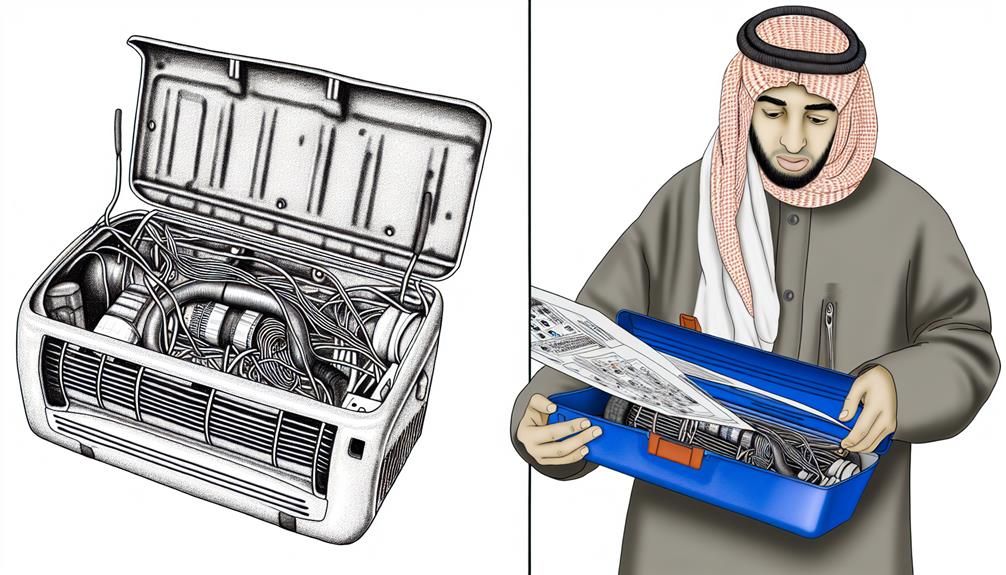
To optimize your portable heater's lifespan, you must perform regular maintenance checks. Keep an eye out for wear signs such as damaged burners or corrosion, which can compromise your heater's functionality. If you hear strange noises, address them promptly as they often indicate underlying problems that need immediate attention.
Regular Maintenance Checks
Inspect your portable heater's burners frequently to ensure they're clean and undamaged, which is crucial for peak performance. This vigilance is part of maintaining a reliable heating system that functions properly. Here are three more essential checks to keep your heater in top condition:
- Routinely examine the fuel system to ensure proper flow and prevent leaks, which can be both dangerous and inefficient.
- Calibrate the heater's controls periodically for accurate temperature settings and to avoid overheating or underheating your space.
- Keep an eye on the heat exchangers to avoid blockages that can impede airflow and diminish heating efficiency.
Identifying Wear Signs
After ensuring your heater's maintenance is up to date, it's crucial to recognize the signs of wear that indicate the need for closer inspection or part replacement. Keep an eye on the heating vents; any obstruction or unusual noise can suggest airflow issues, often due to clogged or damaged heat exchangers. The Fire Protection Association recommends regular checks of fuel systems for leaks, which can be hazardous.
Here's a simple table to guide your inspections:
| Component | What to Inspect | Action Required |
|---|---|---|
| Burners | Cleanliness, damage | Clean or replace |
| Fuel System | Leaks, proper flow | Repair, maintain |
| Controls | Calibration accuracy | Calibrate |
| Heat Exchangers | Clogging, blockages | Clean or replace |
| Worn-out Parts | General wear and tear | Prompt replacement |
Regularly monitoring these components can significantly enhance your portable heater's performance and longevity.
Addressing Strange Noises
When your portable heater starts making unusual noises, it's often a sign that internal components need attention. Strange noises can indicate a range of issues that, if left unchecked, may affect the efficiency and longevity of your heating equipment. Here's what you should do:
- Inspect Burners: Ensure they are clean and undamaged for optimal performance.
- Check Fuel Systems: Look for proper flow and potential leaks to maintain efficiency.
- Calibrate Controls: Periodically calibrate for accurate temperature regulation.
Addressing these common issues promptly can save energy and reduce operating costs. Don't ignore any strange noises—regular maintenance is key to the health of your portable heater.
Safe Operation Procedures
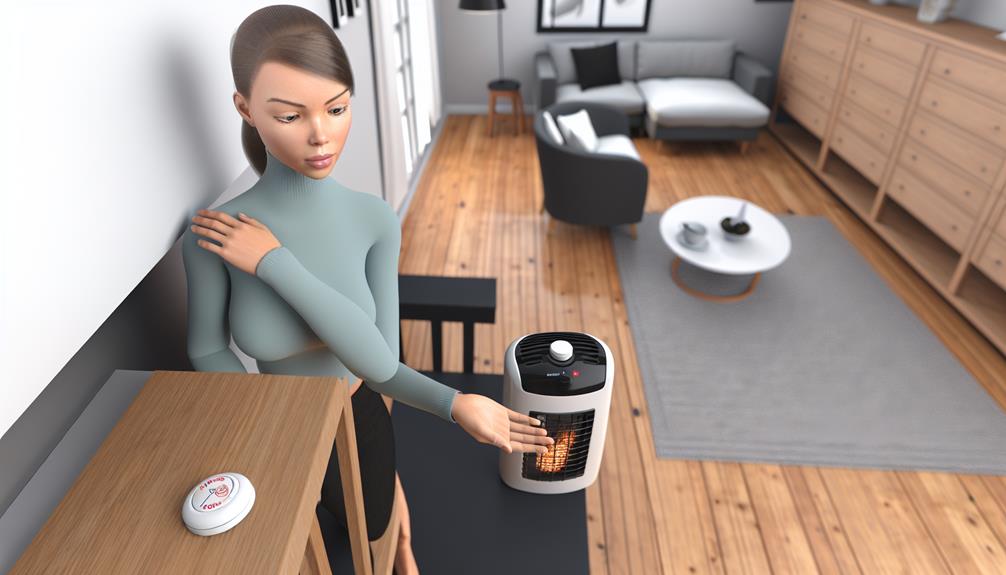
To ensure your portable heater operates safely, you must adhere to specific placement guidelines, such as keeping it away from combustibles and on a level surface. Regular maintenance checks are crucial; inspect your heater for dust accumulation and verify that all electrical connections are intact. Familiarize yourself with its safety features, including automatic shut-off mechanisms and overheating protection, to prevent accidents and extend the unit's lifespan.
Heater Placement Guidelines
Ensure you place your portable heater on a stable, flat surface to avoid any risk of tipping and potential hazards. Following heater placement guidelines is crucial to safely heat your home. Here's what you need to remember:
- Maintain Clearance: Keep the heater at least 3 feet away from anything that can burn, such as furniture, curtains, or bedding, to prevent fire risks.
- Ventilation is Key: Always ensure proper airflow by keeping air intake and exhaust vents unobstructed to avoid overheating.
- Direct Connection: Plug your heater directly into a wall outlet. Using extension cords can lead to overheating and increases the risk of fire.
Regular Maintenance Checks
Regularly inspect your heater's fuel system to catch leaks early and maintain a safe operation. These regular maintenance checks are vital to extend the life of your portable heater. Calibrate the controls periodically to ensure they're regulating the temperature accurately, which is essential for both safety and efficiency. Keep an eye on the heat exchangers; any clogging or blockages can impede airflow and reduce your heater's functionality. Always adhere to the manufacturer's recommended maintenance schedule. This ensures you're performing inspections at the right intervals. Additionally, make sure heating vents are clean and clear of any obstructions. Maintaining unblocked airflow is crucial for the safe and efficient operation of your portable heater.
Understanding Safety Features
Building on the foundation of regular maintenance, familiarizing yourself with your portable heater's safety features is key to preventing accidents and preserving its longevity. Here are three critical safety features to keep an eye on:
- Consistent Temperature Control: Ensure your heater maintains a steady temperature, as fluctuations can indicate potential safety issues.
- Normal Operating Noises: Recognize the standard sounds your heater makes. Unusual noises may signal a need for immediate inspection or repair.
- Burners, Fuel Systems, and Controls: Regularly check these components for any signs of wear or damage, and clean or replace them as needed.
Stay vigilant and adhere to OSHA and EPA guidelines to ensure the safe operation of your heating equipment. Remember, safety is paramount to both performance and the lifespan of your portable heater.
Energy Efficiency Tips
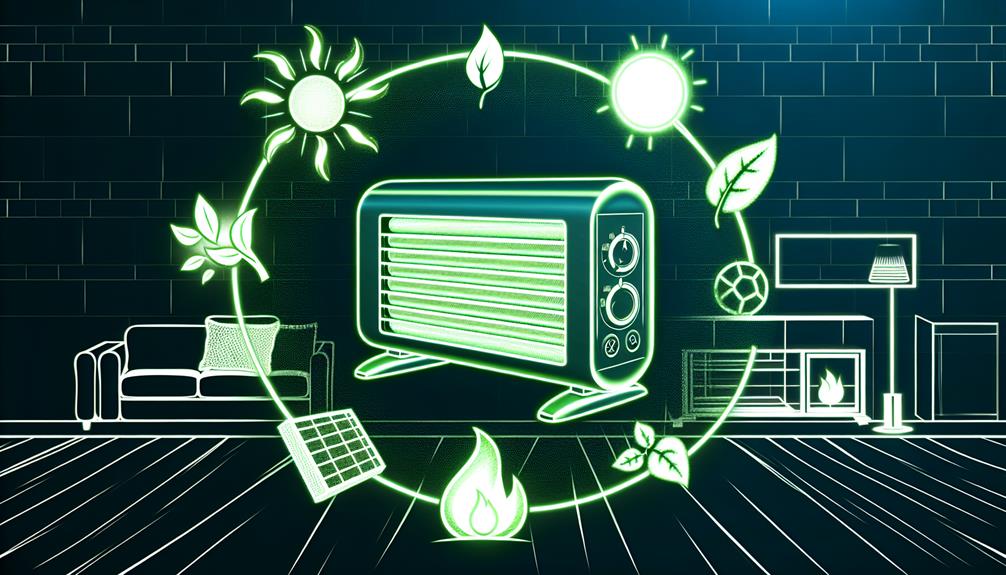
To enhance your portable heater's energy efficiency, start by cleaning and inspecting the burners frequently, as this maximizes heat output and reduces fuel waste. Ensuring that burners are free of debris and functioning properly is a crucial step in conserving energy. It's also important to conduct routine inspections of your heater's fuel systems. Check for proper flow and address any leaks immediately to ensure optimal performance and prevent unnecessary fuel consumption.
In addition to maintaining the burners and fuel system, calibrate your heater's controls periodically. Accurate temperature settings prevent the unit from working harder than necessary, which maintains energy efficiency. This is an essential aspect of energy efficiency tips, as it regulates heater usage in line with your actual needs.
Regular monitoring and cleaning of heat exchangers are imperative to prevent clogging and maintain proper airflow. Adequate airflow is essential for efficient operation; obstructions can lead to higher energy consumption as the heater struggles to distribute heat.
Replacement Parts Management
Managing your portable heater's replacement parts effectively can significantly extend its operational life and reduce the likelihood of emergency repairs. By keeping a keen eye on performance indicators and staying ahead of wear and tear, you'll ensure your heater operates efficiently for years to come.
Here are three crucial steps to consider:
- Inventory Tracking: Keep a detailed inventory of essential components and monitor their condition regularly. This proactive approach allows you to swiftly replace parts before they fail and compromise your heater's performance.
- Systems for Ordering: Establish a reliable system for ordering and receiving parts. This minimizes downtime by ensuring you have the necessary parts on hand when maintenance is due. Coordinate with trusted suppliers to maintain a steady flow of quality components.
- Supplier Coordination: Work closely with your suppliers to guarantee that the parts you need are readily available. This foresight is key to efficient maintenance and prevents prolonged periods without heating due to unavailable parts.
Professional Inspection Recommendations
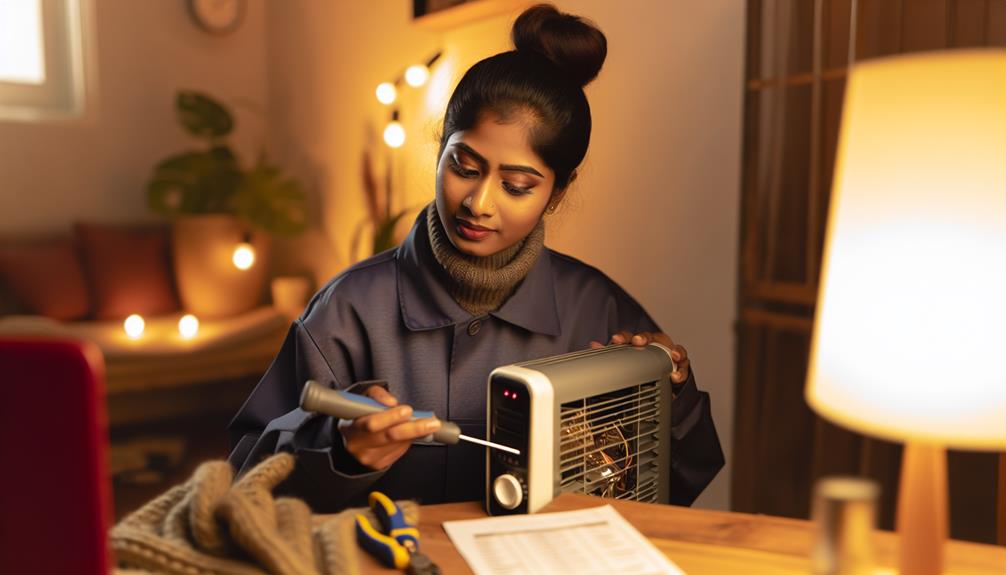
Ensure you schedule an annual professional inspection of your portable heater to identify any potential issues and confirm that it meets safety standards. This is a critical step in maintaining your unit's efficiency and longevity. A certified HVAC technician will assess the condition of your heater, execute performance tests, and check for any signs of wear and tear that could lead to malfunctions or safety hazards.
During the inspection, the technician will also clean or replace air filters, which is essential for maintaining air quality and ensuring proper airflow. Remember, clogged filters force your heater to work harder, reducing its efficiency and lifespan. Moreover, the expert will ensure that heating vents are clean and unobstructed, optimizing your heater's performance.
To support energy conservation, the technician can help optimize your thermostat settings. This ensures you're not overworking the system, which can contribute to premature breakdowns. Lastly, the professional will verify that your heater complies with OSHA and EPA regulations, safeguarding you from potential legal issues and ensuring your environment remains healthy and safe. Adhering to these professional inspection recommendations will keep your portable heater running smoothly and effectively.
Frequently Asked Questions
How Do You Optimize an Electric Heater?
To optimize your electric heater, start with strategic heater placement; ensure it's not obstructed by furniture for even heat distribution. Stick to a strict maintenance schedule, including regular cleaning of filters and coils. Check electrical connections and replace any worn parts promptly. Proper placement and diligent upkeep will not only boost efficiency but also prolong your heater's life, ensuring you stay warm without unnecessary expense or inconvenience.
What Is the Life Expectancy of a Space Heater?
The life expectancy of a space heater largely depends on heater maintenance and usage patterns. You'll find that with diligent care and avoiding overuse, your heater can last several years. Regular cleaning, following the manufacturer's maintenance guidelines, and using it sensibly ensures you get the most out of your investment. Remember, proper care not only prolongs its life but also maintains efficiency and safety.
How Can I Increase the Efficiency of My Electric Heater?
To increase your electric heater's efficiency, start by conducting energy audits; they'll identify inefficiencies. Adjust your thermostat settings; even a small change can reduce power use. Ensure your heater's filters are clean, and there's no obstruction to airflow. Regularly check the heating elements for wear and tear. By following these practical steps, you'll optimize performance, conserve energy, and save on electricity bills without compromising on warmth.
Do Space Heaters Wear Out?
Yes, space heaters do wear out. Picture the coils glowing red, slowly losing their warmth over time. To prevent this, prioritize heater maintenance; keep it clean, and inspect it regularly. When not in use, especially during off-seasons, pack it away properly for seasonal storage. This routine not only ensures safety but also maximizes efficiency, keeping your cozy corner warm for many winters to come.
